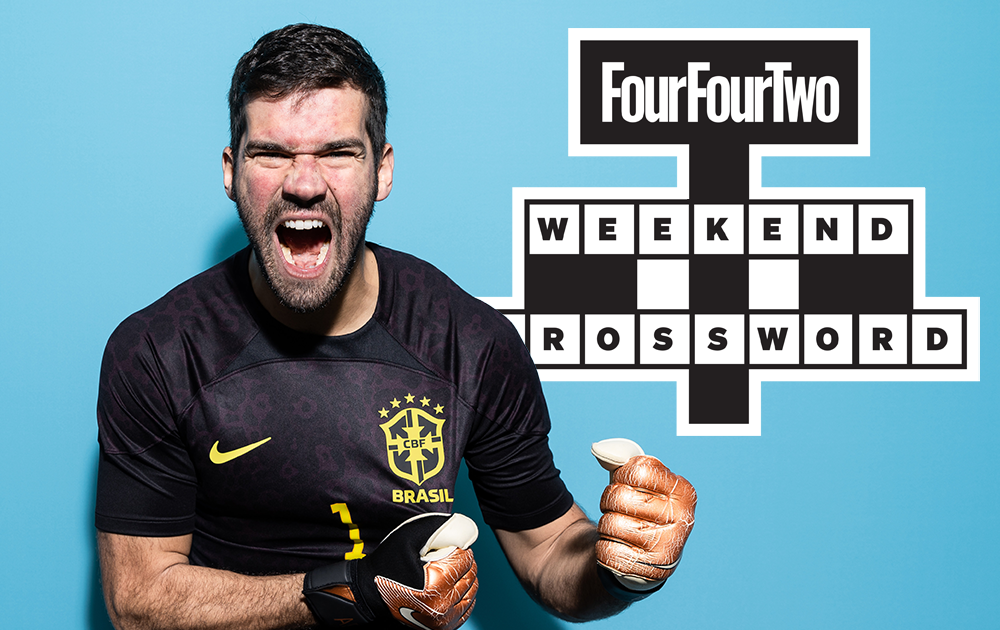
50. Xavi
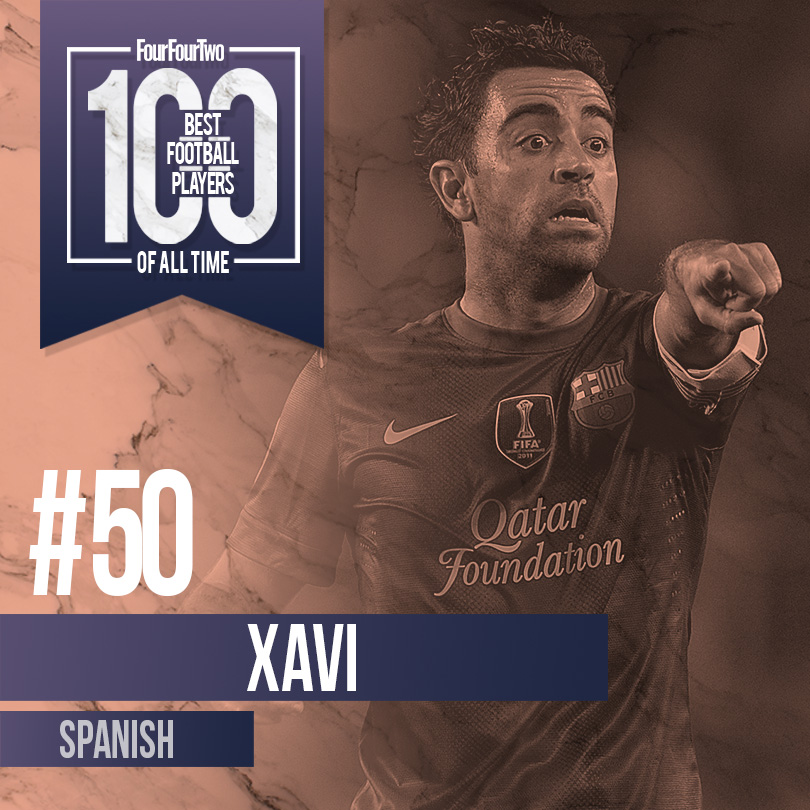
Why are they here?
An era-defining midfielder who sat simultaneously at the heart of two dominant teams: Barcelona and the Spanish national side. His list of honours reflects what he achieved, but the changing trends in football more accurately describe who he was and the influence he had.
Xavi’s heart beat to the rhythm of the game surrounding him, and his sometimes measured, sometimes cutting distribution changed the thinking around his position forever. His 133 Spanish caps put him third on their all-time list behind Iker Casillas and Sergio Ramos, while he was also the first Barcelona captain in history to win a treble twice in his career.
Career highlight
2010. A World Cup and La Liga double, but also a place in UEFA’s Team of the Year and third-place in the Ballon d’Or voting.
- The Big Interview: Xavi – inside the mind of a football genius
Words: Seb Stafford-Bloor
49. Nilton Santos
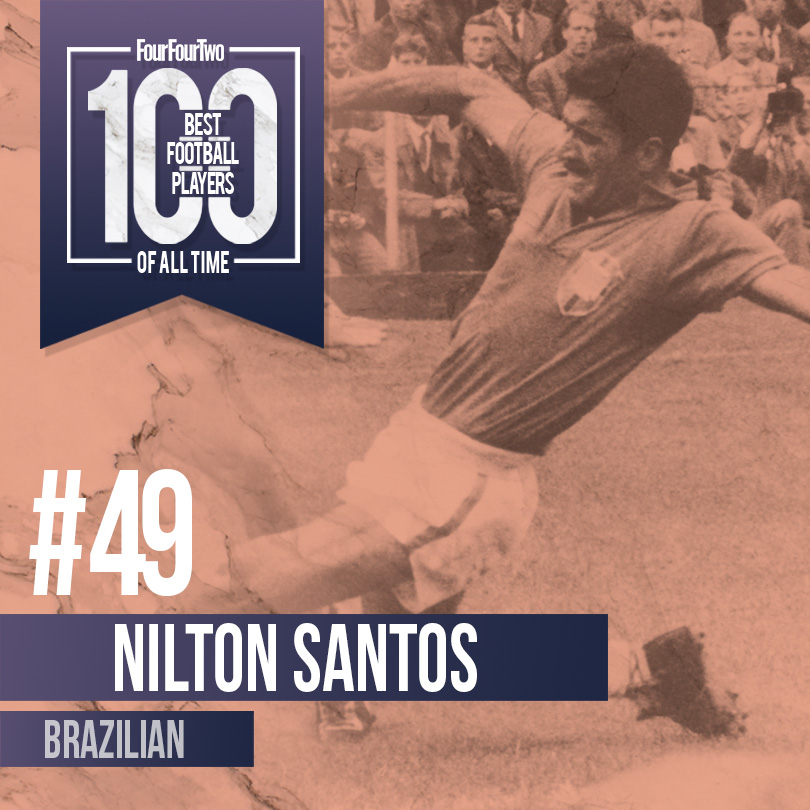
Why are they here?
The man who revolutionised the left-back position in the 1950s was unafraid to go past the halfway line and set a precedent as both a defensive and attacking outlet. Best friends with Garrincha, he was part of one of the greatest ever sides in Brazilian history with Botafogo and was called up for four different World Cups, winning the 1958 and 1962 trophies.
The best features, fun and footballing quizzes, straight to your inbox every week.
He became known as Enciclopedia do Futebol (in English, the Football Encyclopedia) for his knowledge of every detail of the game.
Career highlight
After a foul on a Spanish player inside the Brazilian area at the 1962 World Cup, Santos immediately took a step outside it. The referee was deceived and gave a free-kick rather than a penalty. Brazil would have been out if they'd lost the match.
Words: Marcus Alves
48. Michael Laudrup
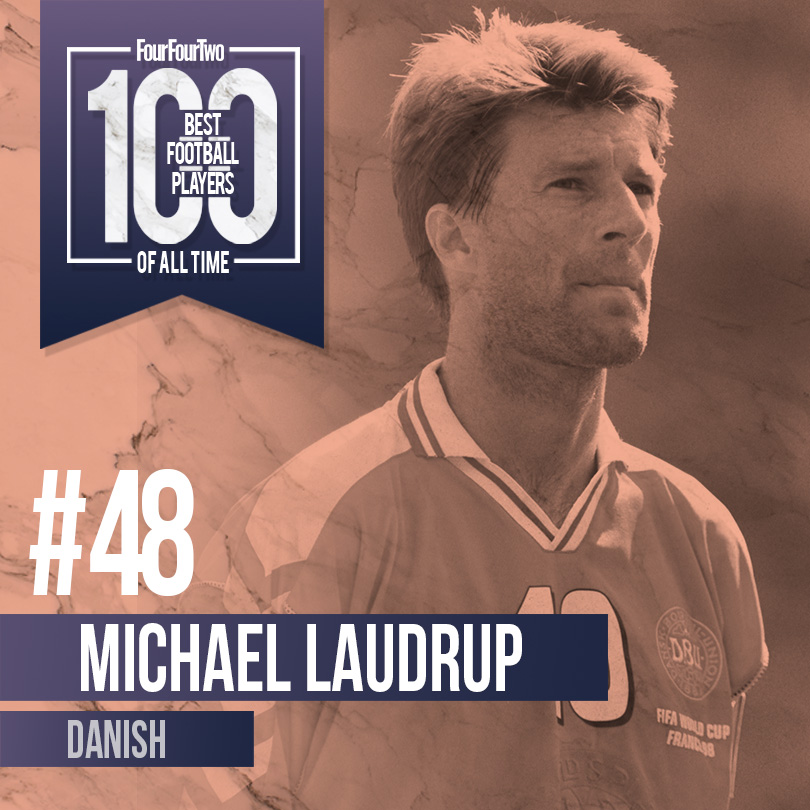
Why are they here?
A playmaker of seamless silkiness, Laudrup stands as the greatest Danish player of all time and among the very best Europeans. At Barcelona, he was a stalwart of Johan Cruyff’s famous Dream Team that won four successive leagues in the early 1990s, turning threaded through-balls into something approaching an art form.
He then showed balls of another sort by upping sticks to Real Madrid and bringing his old side’s title run to an immediate end. Arguably the best pure playmaker of the last four decades, Laudrup has fans on both sides of the Spanish giants' divide. Raul calls him “the best I’ve ever played with”; Andres Iniesta reckon he’s “the best player in history”.
Career highlight
Lifting the European Cup at Wembley in 1992, a trophy that perfectly punctuated the Dream Team’s four-year spell of dominance.
Words: Alex Hess
47. Rivellino
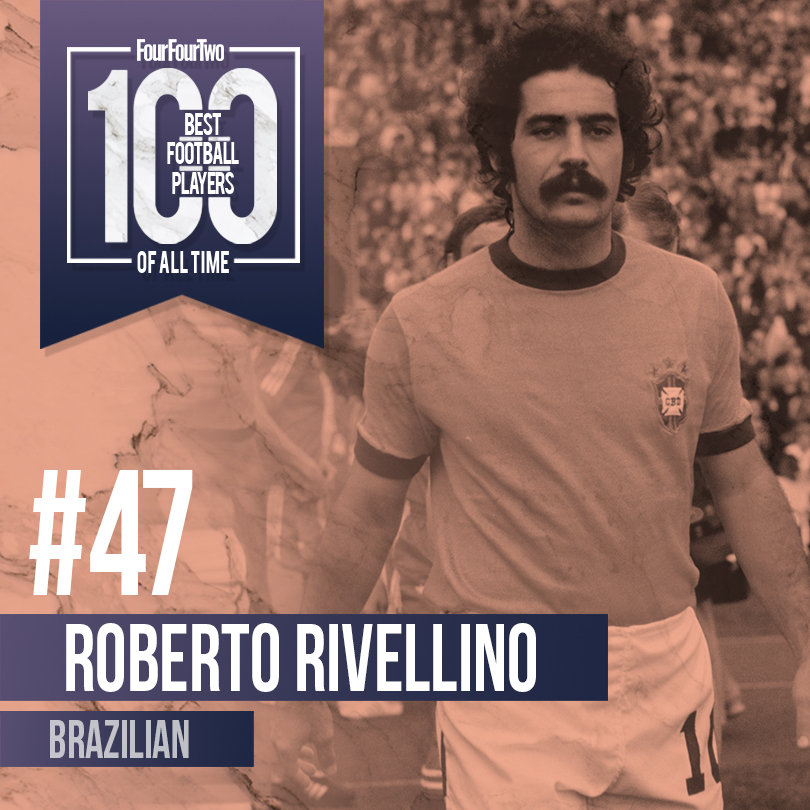
Why are they here?
The most famous moustache in Brazilian football had an unpredictable left foot and became known for his atomic kick. He was the best Seleção player in the fantastic side that devastated opponents at Mexico 1970, and debuted the elastico dribble (or flip-flap) which involved nudging the ball to one side and then flicking it back in the other direction.
Former Italy defender Mario Bertini couldn’t see what was coming and wasn’t able to stop it in Brazil’s 4-1 1970 World Cup Final win.
Career highlight
His bomba (in English, cannon ball) free-kick breaking through the wall in Brazil's first 1970 World Cup match against Czechoslovakia.
Words: Marcus Alves
46. Juan Alberto Schiaffino
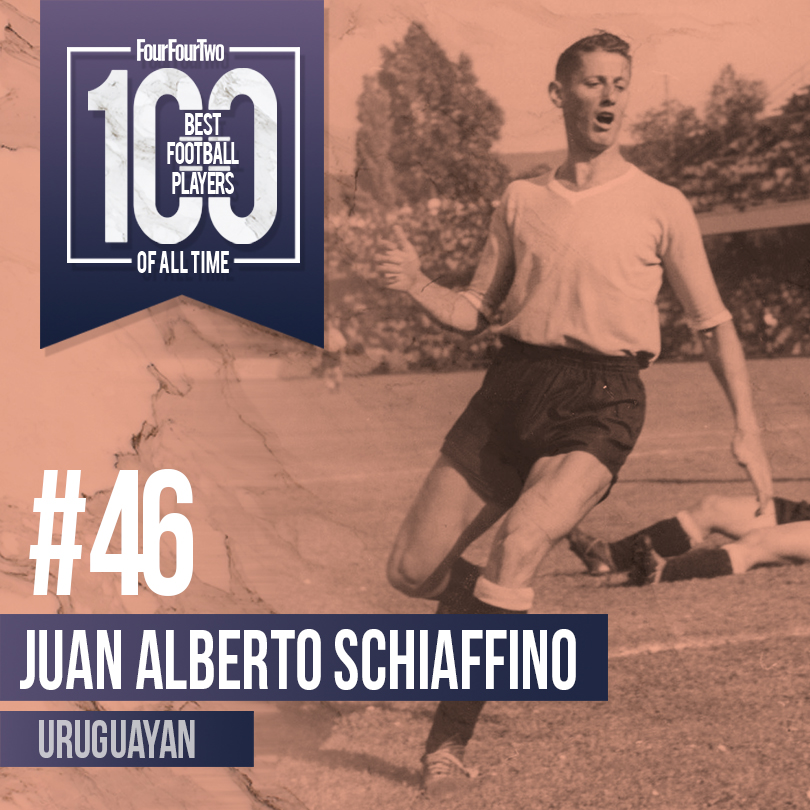
Why are they here?
Tall and slender, Schiaffino possessed a deft touch and sublime technical skills which made him frustratingly unpredictable for opponents. He was one of the most dominant attacking players of his era, winning four championship titles in Uruguay with Penarol, then moving to Italy and helping Milan to win three titles in five years.
His greatest achievement was undoubtedly at the 1950 World Cup – the tournament won by Uruguay against all odds.
Career highlight
In what was technically the World Cup final, Schiaffino scored the equaliser against Brazil in 1950, helping lead Uruguay to one of the greatest sensations of all time.
Words: Michael Yokhin
45. Oleg Blokhin
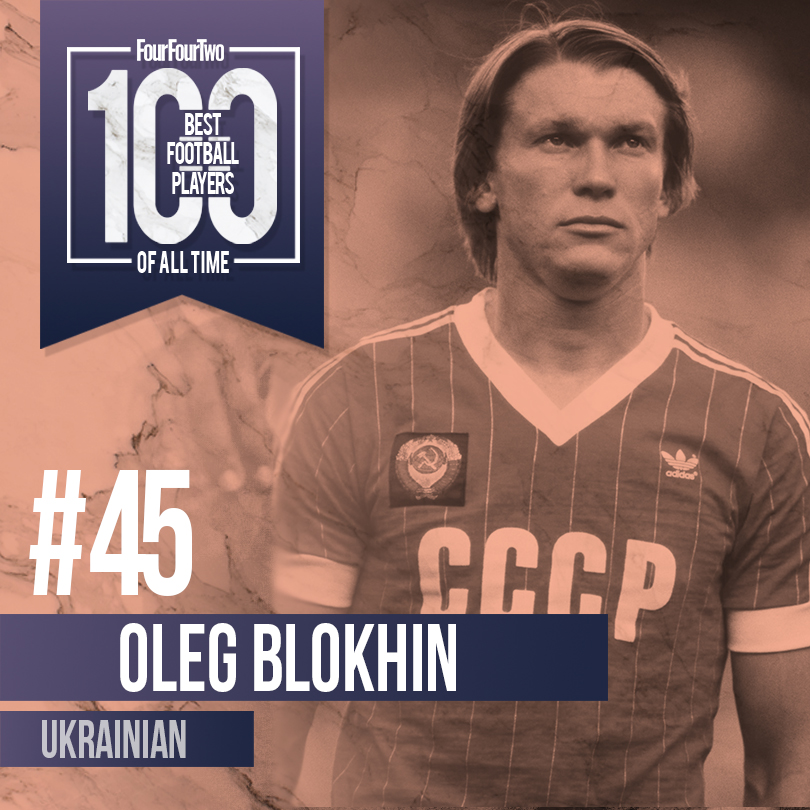
Why are they here?
Ballon d'Or winner in 1975, Blokhin was an unstoppable striker on his day. Fast and skilful, he could run at defenders at full speed, but was also known for brilliant positioning in the penalty area.
He became a top star at an early age under the guidance of legendary manager Valeri Lobanovsky at Dynamo Kiev, and scored 266 goals in all competitions for his beloved club. With Blokhin, the Ukrainians won the Soviet league title six times, became the first Soviet club to lift a European trophy (the Cup Winners' Cup) in 1975 – and repeated the feat in 1986.
Career highlight
Blokhin was absolutely supreme in the European Super Cup against the Bayern Munich's great 1975 side, scoring all three goals as the Ukrainians won 1-0 away and 2-0 at home.
Words: Michael Yokhin
44. Didi
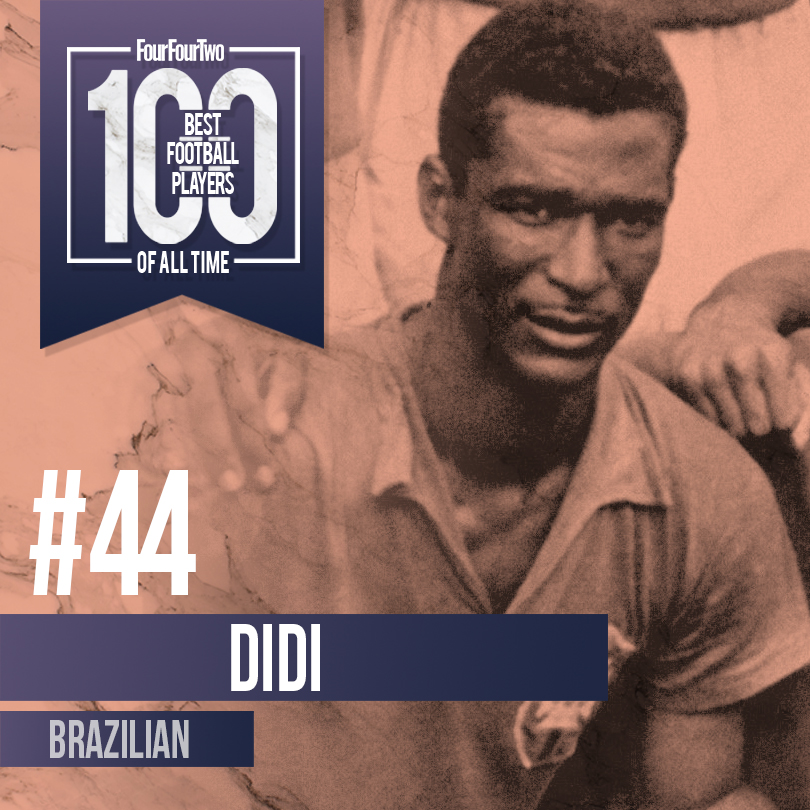
Why are they here?
“I'm nothing compared to Didi. I'll never be anywhere near as good as he is. He's my idol, he's the guy I look up to. The very first picture cards I bought were of him,” said Pele.
What else can you wish for? The Ethiopian Prince, as he was dubbed because of his elegant style, won the World Cup for Brazil in 1958 and 1962. He became famed for his free-kick striking, also called folha seca (in English, 'falling leaf)', a style still emulated these days by Cristiano Ronaldo. Didi had a brief stint with Real Madrid but didn’t get along with the Argentine Alfredo Di Stefano.
Career highlight
Didi masterminded the first two World Cup successes of Brazil and was named the best player of the tournament in 1958.
Words: Marcus Alves
43. Fritz Walter
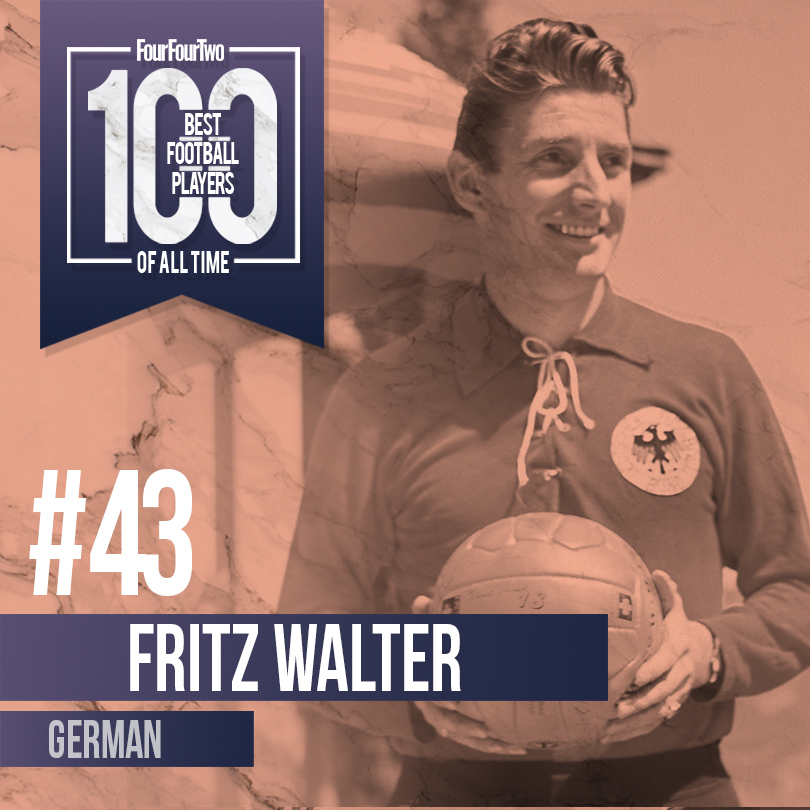
Why are they here?
Walter mostly played in midfield yet managed to average almost a goal per game during his 20 years at Kaiserslautern, the beloved club he led to two German championship titles and refused to leave despite receiving very tempting offers from abroad.
Starring alongside younger brother Ottmar, a centre-forward, he was the leader not only for the club, but also for the West German team that won the World Cup in 1954 against all odds. Walter scored three goals during the tournament, but his overall contribution was much more significant. These days he has an award named after him (the Fritz Walter Medal), given to Germany's brightest youth prospects every season.
Career highlight
Walter was magnificent in West Germany's sensational 3-2 win over Hungary in the 1954 World Cup Final, and had a hand in two goals.
Words: Michael Yokhin
42. Matthias Sindelar
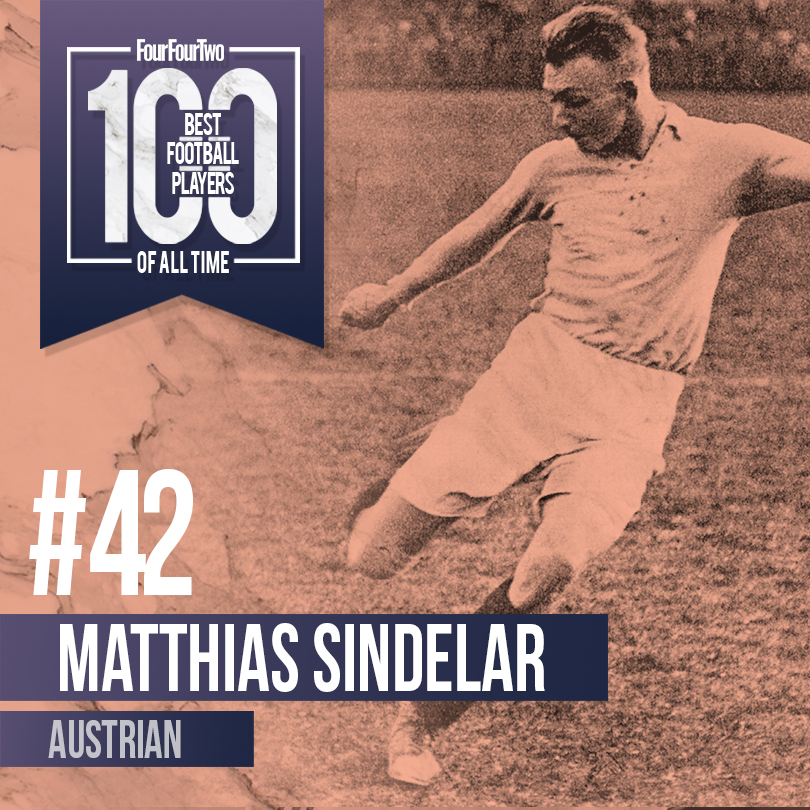
Why are they here?
Nicknamed the Mozart of Football, Sindelar was one of the world's greatest stars in the 1930s, leading the magnificent Austrian national Wunderteam. Imaginative, inventive and outrageously skilful, he ran the show and made the Austrians a joy to watch as he scored 26 goals in 43 matches.
He was also the undisputed leader for Austria Vienna, winning a league championship title and lifting five cups. Sindelar made his political views known too, wildly celebrating his goal for Austria against Germany in 1938, in the 2-0 win right before Anschluss (the annexation of Austria into Nazi Germany). His mysterious death at the age of 35 only added to the myth around the man.
Career highlight
Sindelar captained Austria as they reached the semi-finals of the 1934 World Cup in Italy, where they were controversially beaten by the hosts.
Words: Michael Yokhin
41. Gianluigi Buffon
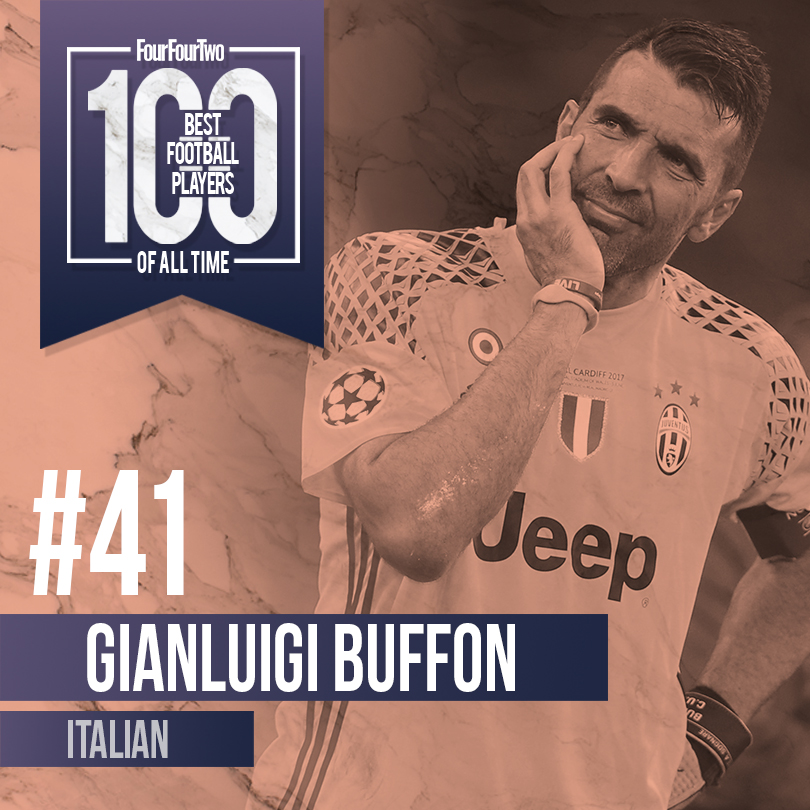
Why are they here?
Most footballers begin to wane when they hit 30, content to let time do its work as they recede gradually into the background. Buffon, though, has managed to balance quality and longevity less like a footballer and more like a 1970s Coppola movie.
He turns 40 in January, yet in the last five years has captained Juventus to five league triumphs and played in two Champions League finals. Touted when he came through as the heir apparent to Italian legend Dino Zoff, the two now stand together as the only goalkeepers to make the Ballon d’Or top two in the past half-century.
Career highlight
Promotion from Serie B with Juventus in 2007, capping a 12 months that entailed Juve’s demotion for their part in the Calciopoli scandal and Italy’s World Cup win. Buffon’s decision to stay and fight for promotion was a pivotal one in the club's history.
- Gianluigi Buffon, One-on-One: You have to be a real masochist to play in goal – and a bit perverse
Words: Alex Hess
The list
100 to 91 • 90 to 81 • 80 to 71 • 70 to 61 • 60 to 51 • 50 to 41 • 40 to 31 • 30 to 21
20 • 19 • 18 • 17 • 16 • 15 • 14 • 13 • 12 • 11 • 10 • 9 • 8 • 7 • 6 • 5 • 4 • 3 • 2 • 1
FourFourTwo's 100 Greatest Footballers EVER
Alex Reid is a freelance journalist and the former digital features editor at FourFourTwo. He has also written for the Guardian, talkSPORT, Boxing News and Sport magazine. Like most Londoners, he is a lifelong supporter of Aberdeen FC. He is deceptively bad in the air for a big man. He has never been a cage fighter.
 Join The Club
Join The Club






